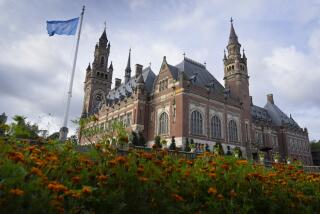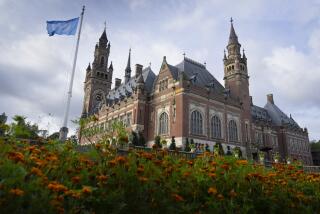Milosevic Says He’s the Victim
- Share via
THE HAGUE — Slobodan Milosevic finally got his day in court Thursday, and he made the most of it.
Representing himself in his war crimes trial at the international court here, the former Yugoslav president unloaded an opening salvo portraying himself as the victim of a hypocritical Western conspiracy.
Milosevic denied the charges of genocide and crimes against humanity, claiming that the thousands slain and hundreds of thousands driven out of Serbia’s Kosovo province three years ago were mostly victims of a civil war between Serbs and ethnic Albanian terrorists--and, later, NATO airstrikes.
Milosevic’s opening statement was an aggressive, essentially political attempt to turn the proceedings into a trial of the Western nations that he accuses of committing war crimes themselves during the 11-week bombing campaign and then “crucifying” him.
“Concealing one crime with another is something that criminals often do,” Milosevic declared. “This show, which is supposed to take place under the guise of a trial, is actually a crime against a sovereign state, against the Serb people, against me. You wish to try me for things carried out in the capacity of the head of the state in defense of our state and to defend our people from terrorism and from the greatest military machinery the world ever had.”
For more than four hours, Milosevic engaged in courtroom theater. He compared his enemies to Nazis and inquisitors. He displayed photos of dismembered, decapitated and charred corpses of civilians who he said were killed by North Atlantic Treaty Organization bombardments. He growled and thundered and murmured, his voice and emotions rising and falling in a controlled performance that, although conscious of a worldwide audience, appeared directed primarily at his homeland.
Milosevic seems intent on salvaging his legacy at home. He made a fervent appeal to Serbian sentiments of patriotism and victimization. The former president wore a striped tie in the colors of the Serbian flag and spoke almost exclusively in Serbian, in contrast to pretrial hearings, during which he spoke in English. Serbia is the dominant Yugoslav republic.
On Thursday morning, he bristled with nationalist indignation at a prosecutor’s comment earlier this week about the location of conflict-torn Kosovo, which Serbs consider their hallowed heartland.
“How do you dare say Kosovo borders with Serbia?” Milosevic demanded. “Kosovo is Serbia. The Hague does not ‘border’ the Netherlands. If you do not know that, someone can tell you.”
Milosevic refuses to accept the legitimacy of the court. A lawyer by training, he is representing himself. On Thursday, he painted himself as a feisty underdog and made caustic references to unnamed “bosses” of the prosecutors and their internationally funded budget.
“There’s not a single element of a fair trial,” he said. “There’s an enormous apparatus on one side. A vast media structure on that same side. All kinds of services . . . everything’s at your disposal. What’s on my side? I only have a public telephone booth in the prison. That’s the only thing I have available in order to face here the most terrible kind of libel against my country, my people and me.”
Yet as the day wore on, Milosevic offered a rebuttal of sorts to the prosecution’s two-day opening statement. Countering the charge that his aim of creating a “Greater Serbia” was the motive for crimes against humanity, he said Serbs fought an international legion of Islamic holy warriors in Bosnia-Herzegovina and Kosovo. He also said Serbs had battled Kosovo guerrillas bent on creating a “Greater Albania.”
“The Americans go to the other side of the globe to fight terrorism, and that is considered logical and normal,” he said, jabbing a finger in the air. “Whereas our struggle against terrorism in the heart of our own country is considered a crime.”
He claimed to have opposed the brutal shelling of Sarajevo, the Bosnian capital, by his Bosnian Serb allies during that former Yugoslav republic’s 1992-95 war. He said he was unaware of the existence of inhumane Bosnian Serb detention camps. He said ethnic Albanian terrorists and the fear of airstrikes, not Serbian marauders, provoked the exodus of 850,000 ethnic Albanians from Kosovo in 1999.
“Prisoners of war and unarmed persons were held sacred,” he said. “Whoever violated human rights was held accountable. This was not done by the army and police. They defended their country with honor and chivalry.”
Milosevic may have scored a point when he said prosecutors unfairly quoted a snippet of a 1989 speech to make him sound warlike. He read other excerpts of the text that extolled ethnic harmony and called for a nonviolent “battle” for prosperity and progress.
Moreover, he tried to exploit the fact that the system of international justice in which he has become entangled is nascent, complicated and sometimes ambiguous. He questioned the legality of his arrest and extradition from Yugoslavia and demanded a hearing on the issue. He pointed out that NATO carried out the aerial campaign without the approval of the U.N. Security Council.
And in a reminder that world leaders negotiated with him for years, he dropped names: U.N. Secretary-General Kofi Annan, former U.S. Secretary of State Madeleine Albright, French President Jacques Chirac. With considerable relish, Milosevic recounted a statement in which Chirac said he had vetoed NATO plans to bomb a bridge in Belgrade, the Yugoslav and Serbian capital. Milosevic said he plans to summon the French president and others as witnesses.
Some believe that Milosevic would love to see former President Clinton and other nemeses squirming on the witness stand. The tribunal’s limited subpoena powers make that unlikely, but Milosevic will have the right to cross-examine diplomats, military officers and others expected to take the stand as prosecution witnesses.
Milosevic accused NATO of intentionally killing civilians, including ethnic Albanians who he said were returning to their villages rather than fleeing. But that statement undercut what he said was the pretext for NATO’s attacks.
NATO officials have apologized for the deaths of civilians in 1999 and said that those casualties were unintentional.
During the last hour of his speech, which will continue today, Milosevic tried to counter the litany of horrors presented by prosecutors. He plowed through a long, detailed list of casualties and damage left by the NATO bombardments, evidence that was disturbing but, analysts said, tenuously connected to the charges.
With terse instructions to a court clerk operating a projector, Milosevic narrated grotesque images of corpses, identifying some victims by name: “That’s a little girl. Maritza. . . . These are corpses of refugees--as you can see, most of them are females. . . . All these people were traveling by train. That’s the only crime they had committed.”
And then the man who reigned during war and devastation added, “Or perhaps [it’s] because they were citizens of Serbia.”
More to Read
Sign up for Essential California
The most important California stories and recommendations in your inbox every morning.
You may occasionally receive promotional content from the Los Angeles Times.













